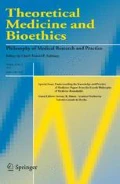Abstract
After criticizing three common conceptions of therelationship between practical ethics and ethical theory, analternative modeled on Aristotle's conception of the relationshipbetween rhetoric and philosophical ethics is explored. Thisaccount is unique in that it neither denigrates the project ofsearching for an adequate comprehensive ethical theory norsubordinates practical ethics to that project. Because the purpose of practical ethics, on this view, is tosecure the cooperation of other persons in a way that respectstheir status as free and equal, it seeks to influence thejudgments of others by providing them with reasons that areaccessible to their own understanding. On this account, theindependence of practical ethics is rooted in an appreciation ofthe constraints that non-ideal circumstances place on the rolethat the philosophically refined premises of moral theory canplay in such public deliberations. Practical and philosophicalethics are united, not by shared theoretical frameworks orprinciples, but by the need to exercise intelligently the sameintellectual and affective capacities. They are separated, notby the particularity or generality of their starting points, butby their responsiveness to the practical problem of facilitatingsound normative deliberations among persons as we find them,under non-ideal circumstances.
Similar content being viewed by others
REFERENCES
Beauchamp TL. On eliminating the distinction between applied ethics and ethical theory. Monist 1984; 67(4): 514–532.
Upton H. Can philosophy legitimately be applied? In Evans M, ed. Advances in Bioethics Volume 4: Critical Reflections on Medical Ethics. Stamford, CT: JAI Press, 1998, pp. 123–138.
Brock DW. Public moral discourse. In: Bulger RE, Bobby EM, Fineberg HV, eds Society's Choices: Social and Ethical Decision Making in Biomedicine. Washington, D.C.: National Academy Press, 1995, pp. 215–240.
MacIntyre A. Does applied ethics rest on a mistake? Monist 1984; 67(4): 498–513.
London AJ. Amenable to reason: Aristotle's rhetoric and the moral psychology of practical ethics. Kennedy Institute of Ethics Journal 2000; 10(4): 287–305.
Moreno JD. Deciding Together: Bioethics and Moral Consensus. New York: Oxford University Press, 1995.
Hare RM. Why do applied ethics? In Rosenthal DM, Shehadi F eds Applied Ethics and Ethical Theory. Salt Lake City UT: University of Utah Press, 1988, pp. 71–83.
Gert B, Culver CM, Clouser KD. Bioethics: A Return to Fundamentals. New York: Oxford University Press, 1997.
Clouser KD, Gert B. A critique of principlism. J Med Philos 1990; 15: 219–236.
Daniels N. Wide reflective equilibrium and theory acceptance in ethics. Journal of Philosophy 1979; 76: 256–282.
Beauchamp TL, Childress JF. Principles of Biomedical Ethics, 4th edn New York: Oxford University Press, 1994.
Jonsen AR, Toulmin SE. The Abuse of Casuistry. Berkely, CA: University of California Press, 1988.
Kuczewski M. Fragmentation and Consensus: Communitarian and Casuist Bioethics. Washington, DC: Georgetown University Press, 1997.
Barnes J, ed. The Complete Works of Aristotle. Princeton: Princeton University Press, 1984.
London AJ. Moral knowledge and the acquisition of virtue in Aristotle's Nicomachean and Eudemian Ethics. The Review of Metaphysics (forthcoming).
Rawls J. Outline of a decision procedure for ethics. The Philosophical Review 1951; 60: 177–197.
Remer G. Political Oratory and conversation: Cicero versus deliberative democracy. Political Theory 1999; 27: 39–64.
Bertram C. Political justification, theoretical complexity, and democratic community. Ethics 1997; 107: 563–583.
Baier A. Theory and reflective practices. In Rosenthal DM, Shehadi F, eds Applied Ethics and Ethical Theory. Salt Lake City UT: University of Utah Press, 1988, pp. 25–49.
Author information
Authors and Affiliations
Rights and permissions
About this article
Cite this article
London, A.J. The Independence of Practical Ethics. Theor Med Bioeth 22, 87–105 (2001). https://doi.org/10.1023/A:1011403909450
Issue Date:
DOI: https://doi.org/10.1023/A:1011403909450



